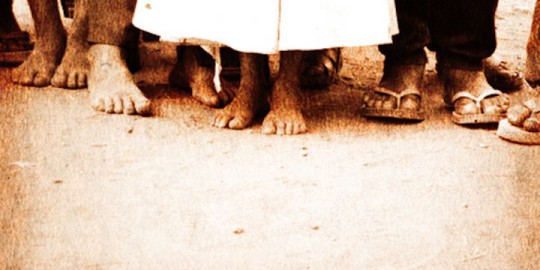The number of people in English-speaking countries who say the have no religion has risen over the past few decades, with younger people being especially likely not to believe (see note 1 for some statistics).
According to this report, the most common stated reason for no longer being religious was intellectual – people came to the conclusion that their previous beliefs were unscientific, illogical or childish. (For other reasons, see note 2.)
I believe we don’t have to give up our faith for intellectual reasons, even if we choose to give up on the church. This post explains why.
It depends what you focus on
There are many reasons to believe in christianity, and many reasons to doubt or disbelieve.
It seems that many people are inclined to focus on what they want to be true, and so they tend to see the reasons that support their preference and miss the reasons that challenge their preference. This can be true for both believers and unbelievers.
It is helpful to look at both sides of the question and recognise the things that both support and undermine my belief. In this post we’ll look at the reasons our christian faith can be strong even when we have doubts, and in the next post we’ll check out how we might deal with some of the challenges.
Can you believe these conclusions?
There are a number of facts and experiences that we will find difficult to explain unless there is a God who cares for people. These facts build on each other to show why we can reasonably keep on believing.
1. Can you believe in an autonomous universe?

If there’s no God then how can we explain the existance of our amazing universe?
Can you believe all this vast array of galaxies and stars, all this energy, the amazing extent of space and time, all appeared out of nothing and for no reason?
Likewise it is hard to believe that it has always existed, for if it started an infinite time ago, everything that could ever happen would have happened long before now.
Furthermore, the universe is held together by physical laws that will only work if a bunch of physical values (like the size and charge on fundamental particles, the value of the various fundamental forces, and so on) are within extremely fine ranges. Physicists have estimated that the probability of this happening by random chance is infinitessimal.
The only scientific explanation for this improbability – that there may be very many universes, and we are just the “lucky” one – doesn’t really change anything for me, because such a remarkable “multiverse” seems just as unlikely as our remarkable universe.
1. So these facts point to a creator God who made the universe for a purpose.
2. Can you believe people are purely physical?
If there’s no God, the world and everything in it must be purely physical, because what is there in atoms and energy to create anything else?
But it is hard to believe human beings are purely physical, and most people can’t really live as if that were true.
No free will?
For if we are purely physical, then there is nothing going on in our brains, and nothing controlling our brains, except physical processes. And we know how physical processes work, according to quite strict laws. Chemical processes and electrical signals work according to laws, and there is nothing else in there. Any choice we make is determined by those physical processes.

So without God, it is hard to see how anyone can choose anything except what those physical processes determine, for they are us, there’s nothing more.
Can you believe that? I can’t, because it doesn’t accord with our experience.
And it is self-contradictory, because the conclusion that there is no God would be determined by those processes rather than by the truth.
No logic?
What’s more, if our brain processes are determined by physics, then it is hard to see how we can reliably think logically. Our attempt at logical reasoning will be at the mercy of physical processes which know nothing about logic. And if that was so, how could we could believe our own brains?
No right & wrong?
Also, human society requires that we all can live together in peace most of the time, otherwise each group or tribe would be dysfunctional and would easily fall prey to other groups. So our societies evolve ethical values and laws which aim to keep everything working efficiently and peacefully. Such values don’t need to be objectively “right”, they just need to work.
But the strange thing is, most of us can’t help think some of these values are really objectively true. Most of us strongly feel that killing or torturing babies, grandmas, and most likely anyone, is repugnant and really wrong. And if we don’t think that, we’d probably be considered a psychopath.
So most of us naturally recoil from the idea that there’s no true right and wrong. But if there’s no God, what can make moral values and laws actually true?
People must be more than physical
So if we believe humans really do have free will, the ability to reason and the ability to make truly moral choices, and because a purely physical world doesn’t allow for freewill, reason and ethics, it is inconsistent to stop believing in God and trying to live as if he or she isn’t there.
2. So the creator God seems to have wanted human beings to evolve to have genuine autonomy and choice, know right and wrong, and be able to think logically.
3. The things that happen to people
Some people have amazing experiences which seem to come from beyond this physical world:
- people pray and ask God for healing, and while often they don’t receive what they ask for, sometimes they do, in ways that medical science cannot explain;
- some people seem to experience God speaking to them or appearing to them in a vision, and this often changes their lives dramatically;
- others have an overwhelming experience of the divine, where they feel love and peace and a sense of awe, and this too has strong and beneficial effects in their lives;
- and without any fanfare or anything dramatic, millions of people experience what seems to them to be God guiding them, comforting them, changing their lives and lifting them out of negativity and hurtful emotions and experiences.

It would be easy to dismiss these experiences as being evidence of weak minds and fanciful thinking, but studies show that most people who have these experiences have good mental health.
Can you believe that every one of these apparent experiences of God is a result of imagination or an unhealthy mind? Surely there are too many healings which defy medical expectations? Too many people’s lives are changed in positive ways?
So although I’ve never had an experience that was obviously more than “natural”, and although I’m sure many of these experiences can be explained in other ways, I cannot make myself discount them all or explain every last one of them away. You too may be led to believe that God is the source of many of these.
3. So it seems that the personal creator God really cares for us and wants to interact with us.
(The evil and suffering in the world throws doubt on this conclusion. I’ll address this in the next post.)
4. I can’t dismiss Jesus
Jesus was arguably the most influential person who ever lived. The originator of the world’s biggest religion. An inspiration to so many people who have set up hospitals, aged care facilities, schools and aid and development programs. (And yes, some have killed and done evil in his name, but they clearly weren’t following his teachings.)

He challenged the status quo, healed, gave respect to those who were disrespected by their society (women, lepers, tax collectors, prostitutes) and inspired people with his ethical teachings. He hated hypocrisy, stood against the prevailing power structures, but loved and mixed with the common people, who loved him in return.
And when he was executed, his followers said they had seen him alive again, and this belief motivated them to set out to change the world. Which they did.
The historians generally affirm that the stories we have about him are based on history, and I cannot believe otherwise.
It is hard to believe he lied or was totally mistaken about who he said he was – God’s agent on earth. We can’t easily dismiss his teachings and say all the stories about him are false.
We can be strengthened in this conclusion by the fact that the God all this evidence points to looks quite consistent with the God Jesus taught us about.
I am further encouraged in this belief by the fact that Jesus is the person I would choose to follow. Compassionate to those who are struggling, tough on those who oppress, strong on justice and love, and with a clear vision of the world he wants to see.
4. So it seems that the loving creator God really did reveal himself to us through Jesus, so we wouldn’t have to die wondering.
The evidence leads us
So the evidence takes us on a journey that points me to the God of Jesus:
- Facts point to a creator God who made the universe for a purpose.
- The creator God seems to have wanted human beings to evolve to have genuine autonomy and choice, know right and wrong, and be able to think logically.
- The personal creator God really cares for us and wants to interact with us.
- The loving creator God really did reveal himself to us through Jesus, so we wouldn’t have to die wondering.
So if you are having doubts, if you wonder if you can keep on the faith journey, I encourage you to ponder, and pray about, the alternative. To consider the evidential difficulties of moving away from belief in God.
We can’t always have certainty about what we believe, but we CAN choose the most likely.
Difficulties and doubts
This evidence counters many of the doubts. The doubts remain, but they can be seen in a different light.
Check out my next post to see how I assess them.
Note 1:
- Andy Tix says that in the US, those with no religion went from 5% in 1972 to 29% in 2022.
- The Guardian reports that for those under 40 in Britain, almost 40% more have no religion than those who are Christians. Wikipedia says more than half Britons have no religion, although some of these still believe in a God or higher power.
- Australian Census data shows about 40% now have no religion, up from 22% only a decade ago.
Note 2:
The main problems were:
- Intellectual (52%)
- Unwillingness to be part of an organisation that traumatised people, e.g. LGBTQI people (22%)
- Personal adversity that didn’t fit with their beliefs (15%)
- Social – they didn’t fit in with a religious community (11%)
Main graphic adapted from Ethan Wilkinson and Brady Knoll. Other graphics: Andromeda galaxy (NASA), woman with fruit (Pexels), silhouette against night sky (Bryce Bradford via Compfight cc) and Jesus’ feet (unknown).





You have presented some very cogent reasons to believe in a God.
The only trouble in my view is religion 🙂
Obviously if a God created the Universe or caused it to be created then every creature in that Universe and any other Universes have the same status to God as they are all his children ?
Why should Christians, Jews or Muslims claim that God belongs to them only ? This divisive process is the cause of many evils in the world today.
Do you think that there is any chance of a “Grand Reconcilliation” where all the religions merge into one and worship the same God , or will we continue to kill each other in the name of “our” God ?
Hi “west”, several very good questions and comments there!
Yeah, if by “religion” you mean what people do with their religious beliefs and experiences, then I tend to agree. TS Eliot wrote “Between the idea and the reality …. falls the shadow” and I think that is the regrettable reality.
I think I’d prefer to say “his loved creation”. But same idea.
I definitely believe God loves Muslims, Jews and atheists just as much as he loves Christians. And so God is available to all of them. But I also think that he has given us the dignity of autonomy and choice (as in the post), so whether we call on God and accept his love is another question.
This is the big question. And christians have different views on it.
(1) Some believe all religions lead equally to God. I don’t fully agree, because I think all religions (and no religion) can lead a person to God, but I don’t think they do that equally.
(2) At the other extreme, some believe that each religion is different and we have to be part of their religion to be acceptable to God. I don’t believe that because I think it would be unfair to people who were born in a country where that religion isn’t active.
(3) I believe all religions and all belief systems and worldviews contain some truth, but I believe some contain more truth than others. And so I believe Christian belief contains more truth than the others. And so I believe that “Jesus died for all sins” (without understanding how that works). So I believe God will hear and accept all who call on him, whatever religion (or none) they follow. But I feel people who hear the story of Jesus are more likely to call on God.
But it seems to me that religion is a powerful force, so many people use it for their own ends (e.g. the angry right wing Republicans in the US, who identify as christian but don’t seem to care for ANY of Jesus’ teachings). So fighting will happen, unfortunately. But I think genuine followers of Jesus (and the Buddha) will avoid anger, violence and fighting if they can.
Does all that make sense?
I’m interested to know what you mean by “his loved creation”.
Are you saying that not all creatures in the Universe are “loved” by God ? Isn’t the point of Christianity that we must love every other creature, even those that don’t measure up to our standards ?
Sorry if I’m putting words in your mouth it’s just an impression I got.
Do you think that religion is essential for finding God ?
I meant all his creation is loved. But in the Bible children of God are not just everyone, but those who choose to join his family. So I was looking for a different way to express the same thought that you were saying.
If religion is the human organisations and systems of thought (e.g. in christianity it would be the church or churches), then no, I think people can reach out to God in all sorts of ways. But the thing is, it is better in a team with other like-minded people. The denominational churches sometimes provide that, sometimes not. Often (I think), it is better to have a group of friends (could be personal or online) who we can relate to and discuss with. Whether that is “religion” or a “church” is a matter of definition I guess.
I thought you might enjoy this.
Feel free to delete it if it doesn’t ‘fit in’.
———————————————————————————————————————
A Catholic priest, Protestant minister and a Rabbi meet up early one morning for a little fishing trip on a local lake. This was a regular event for the priest and minister as they had lived and worked in the area for years. The Rabbi was new having just moved into the area to take over leadership of the local Synagogue. The Minister was driving the boat and had positioned it not too far from a remote part of the shoreline. He and the priest had often fished this spot and usually do well.
After a short while the Priest puts down his fishing rod and tells the other’s he wants to get a coffee and asked if anyone one else wanted one. The Rabbi was confused and asked where he was going to find coffee. The Priest explained that just on shore and over a little hill there was a little country store that always had a pot of coffee ready for guest. The Minister said he didn’t want coffee right then. The Rabbi also decided he didn’t want any but was very curious how the priest was going to get to shore as they were at least 50 yards out. The Priest said no worries, I’ll just walk. He puts his hands together and bows his head for a quick prayer. Steps out of the boat onto the water and walks to shore and over the hill. The Rabbi is stunned. Shortly the Priest is back to the shoreline. Walks out onto the water and back to the boat. The Rabbi says nothing. The Minister then says he wished he had asked for a water while the Priest was going in. But I need to stretch my legs. He to says a quick little prayer and steps out onto the water and off to shore. Shortly he’s back and again walks across the water to the boat.
Now the Rabbi was upset.
Rabbi: You two must think you are so special, and your faith is stronger than mine. I’ll show you!
The Rabbi raises his hands to heaven and loudly asks for heavenly intervention. He then steps out of the boat and immediately sinks below the surface.
The Rabbi pops to the surface and pulls himself back in the boat, but now he is furious. My faith is as strong as yours! Again he looks to heaven and prays. He again steps out of the boat and again he sinks below the waters surface.
The Minister turns to the Priest: Maybe we should show him where that line of underwater stumps is before he drowns.
Haha. Sometimes it’s not who you know but what you know.
“Haha. Sometimes it’s not who you know but what you know.”
🙂